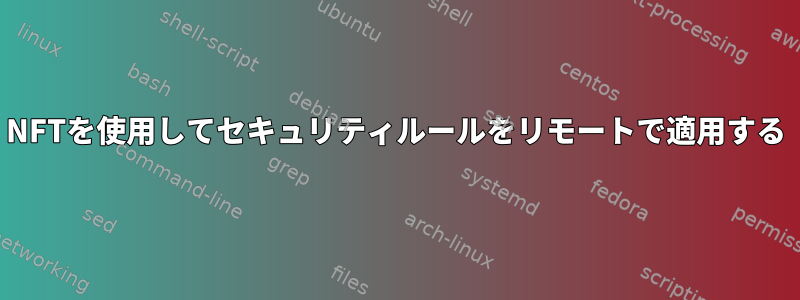
経験がある場合は、Linuxでファイアウォールルールをリモートで安全に適用する方法を教えてくださいNFT。
特にDebianでは、iptables-applyルールに問題がある場合にリモートファイアウォールルールを安全に適用して自分自身をロックするのを防ぐために、長い間これを使用してきました(8)。現在の最新のDebianリリースにはが含まれており、公式の推奨事項は新しいツールの使用を開始することnftablesです。以前のスタイルルールをインスタント変換するラッパーがあることを知っていますが、以前のスタイルと新しいスタイルを混在させないようにすべての場所で提案したので、最終的にすべてのルールを新しい(一種の)スタイルに切り替えることにしましたが、それでもそうです。人間であり、間違ったルールでリモートサーバーをすばやくロックしないでください。を使用する以外に、同じことを行うプログラムはありますか?iptablesnftiptablespfiptables-applynft
何らかの理由でGoogleとBingの両方がこの事実を秘密に保っているので、誰でも私に真実への道を教えてくれてありがとう。
PS半月前にスーパーユーザーに同じ質問を投稿しましたが、誰も解決策を見つけることができませんでした。
答え1
iptables-applyは、nftと互換性があるように編集できる非常に基本的なbashスクリプトです。だとしたらどこかに投稿していただければ幸いです。
答え2
nftablesへのiptables-applyの無料適用は次のとおりです。
#!/usr/bin/env bash
#
# This program is free software: you can redistribute it and/or modify it
# under the terms of the GNU General Public License as published by the
# Free Software Foundation, either version 3 of the License, or (at your
# option) any later version. Please see LICENSE.txt at the top level of
# the source code distribution for details.
#
# @package nftables-apply
# @author <[email protected]>
# @link https://github.com/fbouynot/scripts/blob/main/nftables-apply
# @copyright <[email protected]>
#
# Free adaptation for nftables of iptables-apply (https://github.com/wertarbyte/iptables/blob/master/iptables-apply)
#
# -e: When a command fails, bash exits instead of continuing with the rest of the script
# -u: This will make the script fail, when accessing an unset variable
# -o pipefail: This will ensure that a pipeline command is treated as failed, even if one command in the pipeline fails
set -euo pipefail
# Replace the Internal Field Separator ' \n\t' by '\n\t' so you can loop through names with spaces
IFS=$'\n\t'
# Enable debug mode by running your script as TRACE=1 ./script.sh instead of ./script.sh
if [[ "${TRACE-0}" == "1" ]]
then
set -o xtrace
fi
# Define constants
PROGNAME="${0##*/}"
VERSION='1.2.4'
RED="$(tput setaf 1)"
NC="$(tput sgr0)" # No Color
DEFAULT_TIMEOUT=15
DEFAULT_DESTINATION_FILE='/etc/nftables.conf'
DEFAULT_SOURCE_FILE='/etc/nftables-candidate.conf'
readonly PROGNAME VERSION RED NC DEFAULT_TIMEOUT DEFAULT_DESTINATION_FILE DEFAULT_SOURCE_FILE
help() {
cat << EOF
Usage: ${PROGNAME} [-Vh] [ { -s | --source-file } <source-file> ] [ { -d | --destination-file } <destination-file> ] [ { -t | --timeout } <timeout> ]
-h --help Print this message.
-V --version Print the version.
-s --source-file STRING The source file for candidate config. (default: ${DEFAULT_SOURCE_FILE})
-d --destination-file STRING The destination file where to write the config. (default: ${DEFAULT_DESTINATION_FILE})
-t --timeout INT The time to wait before rolling back. (default: ${DEFAULT_TIMEOUT})
EOF
exit 2
}
version() {
cat << EOF
${PROGNAME} version ${VERSION} under GPLv3 licence.
EOF
exit 2
}
# Deal with arguments
while [[ $# -gt 1 ]]
do
key="${1}"
case $key in
-h|--help)
help
;;
-s|--source-file)
export source_file="${2}"
shift # consume -s
;;
-d|--destination-file)
export destination_file="${2}"
shift # consume -d
;;
-t|--timeout)
export timeout="${2}"
shift # consume -t
;;
-V|--version)
version
;;
*)
;;
esac
shift # consume $1
done
# Set defaults if no options specified
source_file="${source_file:-$DEFAULT_SOURCE_FILE}"
destination_file="${destination_file:-$DEFAULT_DESTINATION_FILE}"
timeout="${timeout:-$DEFAULT_TIMEOUT}"
# Change directory to base script directory
cd "$(dirname "${0}")"
# Check root permissions
check_root() {
# Check the command is run as root
if [ "${EUID}" -ne 0 ]
then
echo -e "${RED}E:${NC} please run as root" >&2
exit 3
fi
return 0
}
restore() {
nft flush ruleset
nft -f /tmp/nftables.conf.bak
rm -f /tmp/nftables.conf.bak
# Start fail2ban
if systemctl is-enabled fail2ban > /dev/null 2>&1
then
systemctl start fail2ban 2>/dev/null
fi
return 0
}
save() {
cp "${source_file}" "${destination_file}"
echo -e "\nConfiguration changed"
return 0
}
# Main function
main() {
# Check the command is run as root
check_root
# Check if we can read the destination file
if [[ ! -r "${destination_file}" ]]
then
echo -e "${RED}E:${NC} cannot read ${destination_file}" >&2
exit 4
fi
# Backup current ruleset
nft list ruleset > /tmp/nftables.conf.bak
# Check if we can read the source file
if [[ ! -r "${source_file}" ]]
then
echo -e "${RED}E:${NC} cannot read ${source_file}" >&2
exit 5
fi
# Dry run new ruleset, exit if failures
nft -f "${source_file}" || (echo -e "${RED}E:${NC} Invalid rules, exiting" >&2 && exit 6)
# Check the candidate configuration starts by flushing ruleset
if [[ $(head -n 1 /etc/nftables-candidate.conf) != "flush ruleset" ]]
then
sed -i '1s/^/flush ruleset\n/' "${source_file}"
fi
# Stop fail2ban
if systemctl is-active fail2ban > /dev/null 2>&1
then
systemctl stop fail2ban 2>/dev/null
fi
# Apply new ruleset, rollback if timeout
timeout "${timeout}"s nft -f "${source_file}" || (echo -e "${RED}E:${NC} timeout while applying new configuration, rolling back to the previous ruleset" >&2 && restore && exit 7)
# Ask the user if they can open a new connection
# If they can't, rollback
# If they can, save
echo -n "Can you establish NEW connections to the machine? (y/N) "
read -r -n1 -t "${timeout}" answer 2>&1 || :
if [[ "${answer}" == "y" ]]
then
save
else
echo -e "\n${RED}E:${NC} rolling back to the previous ruleset" >&2
restore
exit 8
fi
rm -f /tmp/nftables.conf.bak
# Start fail2ban
if systemctl is-enabled fail2ban > /dev/null 2>&1
then
systemctl start fail2ban 2>/dev/null
fi
exit 0
}
main "$@"


